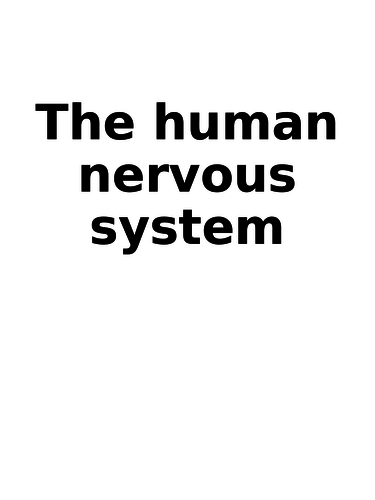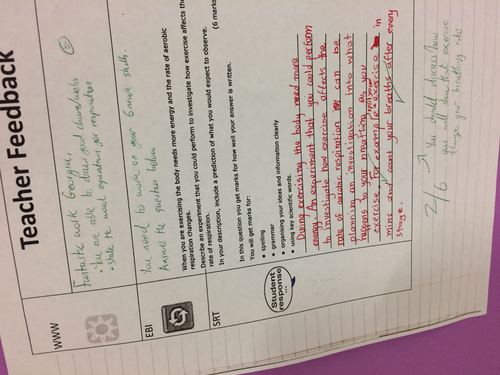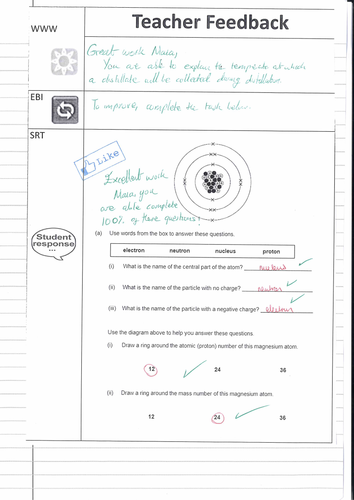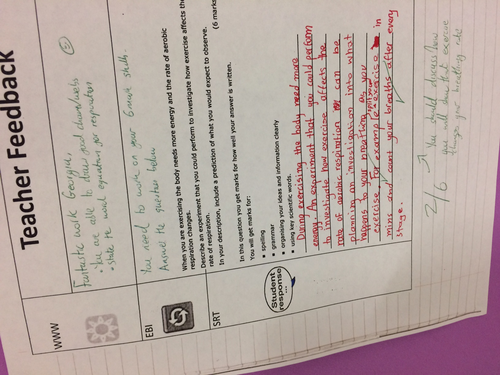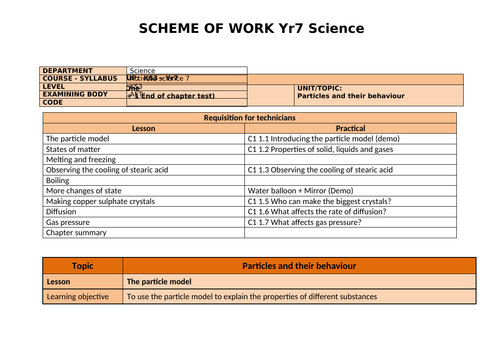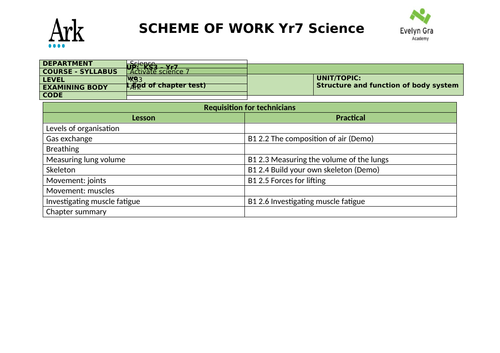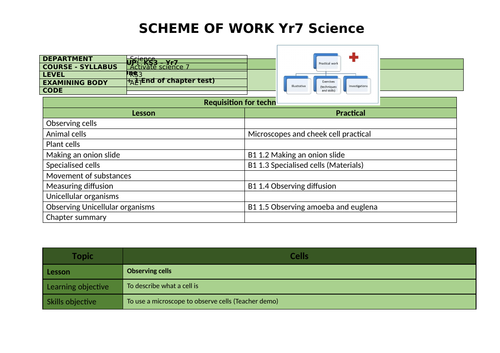243Uploads
110k+Views
55k+Downloads
All resources

Rutherford & The Nuclear Model
In this lesson, learners discover how Rutherford and his students deduced the nuclear model from the alpha scattering experiement.

J J Thomson & Plum Pudding Model
Learners will discover how JJ Thomson came up with his Plum Pudding Model and will also see how Millikan discovered the charge of the electron.

Atomic Theory
In this lesson, learners will learn about the billiard ball model, plum pudding model, nuclear model and Bohr model of the atom.
They will also learn the contribution of James Chadwick and how to distinguish the different sub-atomic particles.

KS4 Biology 2 Marking and Feedback Exam questions with Answers (Formative assessment)
I’ve uploaded an image of the finished product.
This should be used ideally as a formative assessment before the summative assessment.
The teacher (using your school’s designated colour) writes a WWW and relates the EBI to one of the tasks.
The student completes the task using their designated feedback pen.
The teacher follows up and marks the work with comments on how to improve.
Since each unit has four different questions of various abilities, you can also differentiate.
This pack is for Biology 2 and included 4 question sheet for these units:
B10 The Human nervous system
B11 Hormonal coordination
B13 Reproduction
B14 Variation and evolution
B15 Genetics and evolution
B16 Adaptations, interdependence and competition
B17 Organising an ecosystem
B18 Biodiversity and ecosystems

KS4 Biology 1 Marking and Feedback Exam questions with Answers (Formative assessment)
I’ve uploaded an image of the finished product.
This should be used ideally as a formative assessment before the summative assessment.
The teacher (using your school’s designated colour) writes a WWW and relates the EBI to one of the tasks.
The student completes the task using their designated feedback pen.
The teacher follows up and marks the work with comments on how to improve.
Since each unit has four different questions of various abilities, you can also differentiate.
This pack is for Biology 1 and included 4 question sheet for these units:
B1 Cell structure
B2 Cell division
B3 Digestion
B4 Organising plants and animals
B5 Communicable diseases
B6 Preventing and treating diseases
B7 Non-communicable diseases
B8 Photosynthesis
B9 Respiration

KS4 Physics 2 Marking and Feedback Exam questions with Answers (Formative assessment)
I’ve uploaded an image of the finished product.
This should be used ideally as a formative assessment before the summative assessment.
The teacher (using your school’s designated colour) writes a WWW and relates the EBI to one of the tasks.
The student completes the task using their designated feedback pen.
The teacher follows up and marks the work with comments on how to improve.
Since each unit has four different questions of various abilities, you can also differentiate.
P8 Forces in balance
P9 Motion
P10 Force and motion
P12 Wave properties
P13 Electromagnetic waves
P15 Electromagnetism

NEW BTEC Tech Awards - Health and Social care - Student Planning Sheets - Component 1
A 10 paged document that covers the two learning aims of Component 1:
Learning aim, A: Understand human growth and development across life stages and the factors that affect it.
Learning aim, B: Investigate how individuals deal with life events.
The learning aims are structured into three parts:
Information gathering task: A series of small tasks that once completed provide a frame work of information for the main task. Each of these tasks has a modelled answer and hints when needed.
Main task: A task with a series of reminders that if answered with the aid of the assessment criteria should aim pupils towards a Distinction.
Assessment criteria: The assessment criteria and code for each learning aim presented in a student friendly format so that they can track their target grade and ensure that they are meeting the necessary criteria.

KS4 Physics 1 Marking and Feedback Exam questions with Answers (Formative assessment)
I’ve uploaded an image of the finished product.
This should be used ideally as a formative assessment before the summative assessment.
The teacher (using your school’s designated colour) writes a WWW and relates the EBI to one of the tasks.
The student completes the task using their designated feedback pen.
The teacher follows up and marks the work with comments on how to improve.
Since each unit has four different questions of various abilities, you can also differentiate.
This pack is for Physics 1 and included 4 question sheet for these units:
P1 Conservation and dissipation of energy
P2 Energy transfer by heating
P3 Energy resources
P4 Electric circuits
P5 Electricity in the home
P6 Molecules and matter
P7 Radioactivity

KS4 Chemistry 1 Marking and Feedback Exam questions with Answers (Formative assessment)
I’ve uploaded an image of the finished product.
This should be used ideally as a formative assessment before the summative assessment.
The teacher (using your school’s designated colour) writes a WWW and relates the EBI to one of the tasks.
The student completes the task using their designated feedback pen.
The teacher follows up and marks the work with comments on how to improve.
Since each unit has four different questions of various abilities, you can also differentiate.
This pack is for Chemistry 1 and included 4 question sheet for these units:
C1 Atomic structure
C2 The periodic table
C3 Structure and bonding
C4 Chemical calculations
C5 Chemical changes
C6 Electrolysis
C7 Energy changes

Yr7 Particles. Scheme of Work for Kerboodle Activate 1 (SoW)
Content
Lesson objective
Skills objective
Learning outcomes
Keywords
Numeracy
Practical
Homework
Misconceptions
Key questions to ask
Lesson plans:
The particle model (Practical)
States of matter (Practical)
Melting and freezing
Observing the cooling of stearic acid (Practical)
Boiling
More changes of state (Practical)
Making copper sulphate crystals (Practical)
Diffusion (Practical)
Gas pressure (Practical)
Chapter summary

Yr7 Body systems. Scheme of Work for Kerboodle Activate 1 (SoW)
Content
Lesson objective
Skills objective
Learning outcomes
Keywords
Numeracy
Practical
Homework
Misconceptions
Key questions to ask
Lesson plans:
Levels of organisation
Gas exchange (Practical)
Breathing
Measuring lung volume (Practical)
Skeleton (Practical)
Movement: joints (Practical)
Movement: muscles
Investigating muscle fatigue (Practical)
Chapter Summary

Yr7 Cells Scheme of Work Kerboodle Activate 1 (SoW)
Content
Lesson objective
Skills objective
Learning outcomes
Keywords
Numeracy
Practical
Homework
Misconceptions
Key questions to ask
Lesson plans:
Observing cells
Animal Cells (Practical)
Plant cells
Making an onion slide (Practical)
Specialised cells (Practical)
Movement of substances
Measuring diffusion (Practical)
Unicellular organisms
Observing Unicellular Organisms (Practical)
Chapter Summary

B1.5.2 Observing unicellular organisms
Kerboodle Activate (1)
Chapter 1: Cells
The Kerboodle worksheet are not included so as to be acting within the TES code of conduct.
Keywords: Unicellular, Amoeba, Euglena, Flagellum

B1.5 Unicellular organisms
Kerboodle Activate (1)
Chapter 1: Cells
The Kerboodle worksheet are not included so as to be acting within the TES code of conduct.
Keywords: Unicellular, Amoeba, Euglena, Flagellum

B1.4.2 Measuring diffusion
Kerboodle Activate (1)
Chapter 1: Cells
The Kerboodle worksheet are not included so as to be acting within the TES code of conduct.
Keywords: Diffusion, Agar, Osmosis

B1.4 Movement of substances
Kerboodle Activate (1)
Chapter 1: Cells
The Kerboodle worksheet are not included so as to be acting within the TES code of conduct.
Keywords: Diffusion, Concentration, Osmosis

B1.2.3 Making an onion slide (Practical)
Kerboodle Activate (1)
Chapter 1: Cells
The Kerboodle worksheet are not included so as to be acting within the TES code of conduct.

B1.2.1 Plant cells
Kerboodle Activate (1)
Chapter 1: Cells
The Kerboodle worksheet are not included so as to be acting within the TES code of conduct.
Keywords: Chloroplast, Cell wall, Chloroplasts, Photosynthesis

B1.2.1 Animal cells
Kerboodle Activate (1)
Chapter 1: Cells
The Kerboodle worksheet are not included so as to be acting within the TES code of conduct.
Keywords: Nucleus, Cell membrane, Cytoplasm, Mitochondria, Organelle

B1.1 Observing cells
Kerboodle Activate (1)
Chapter 1: Cells
Lesson 1: B1.1 Observing cells
The Kerboodle worksheet are not included so as to be acting within the TES code of conduct.
Keywords: Organisms, Cells, Microscope, Observation, Slide, Magnification, Objective lens, Eye-piece lens




